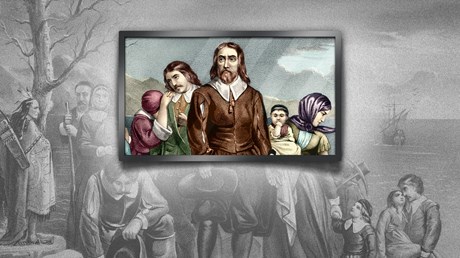Pop culture has given us a distorted picture of the religious separatists who founded Plymouth Colony. Historian John Turner sets the record straight.

Pilgrims have become a staple of American life and culture. We hear them referenced in political speeches by both Republicans and Democrats and see them depicted in artwork in museums across the country. Wildly historically inaccurate (and often risqué) Pilgrim costumes usually crop up at Halloween parties. Television programs, from WGN’s Salem to Sky One’s Jamestown, feature Pilgrims, Puritans, and other sources of early American drama.
Of course, with Thanksgiving only a few weeks away, op-eds concerning the good, the bad, and the ugly side of the Pilgrims’ arrival in America will be shared all across social media. Already this year, they have been enlisted as part of the pushback against the New York Times’s much-debated 1619 Project, with the National Association of Scholars launching the 1620 Project to invoke “the year in which the pilgrims landed at Plymouth Rock and the Mayflower Compact was signed.”
Historian John G. Turner enters into this much-contested territory with his latest book, They Knew They Were Pilgrims: Plymouth Colony and the Contest for American Liberty. Published in conjunction with the 400th anniversary of the founding of Plymouth Colony, the book centers on the concept of liberty: how the colonists pursued it and exercised it, even as they differed in their understanding of what it entailed.
Invention and Reinvention
Debates over the meaning of Christian liberty, as well as the boundaries of liberty of conscience, are a common feature of early American history, and in Turner’s narrative, groups such as Catholics, Quakers, the Wampanoag community, and other Native Americans bring these disputes into sharp (and often violent) focus.
At the same time, Turner ...
from Christianity Today Magazine
via

.gif)

.gif)

.gif)
.gif)
